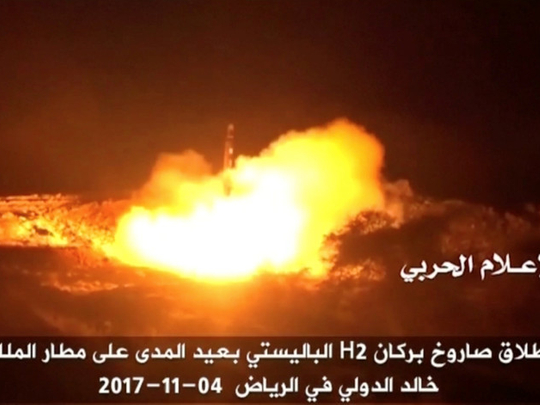
Dubai: A missile fired by Iran-backed rebels in Yemen towards Riyadh on Saturday night was a desperate cover-up for their repeated failures in Yemen, Retired Saudi Brigadier Hassan Al Shahri told the Saudi Al Majd television station.
“This aggression should not be underestimated because it is a massive development in the military capabilities of Al Houthi militias,” he said, accusing Iran and Hezbollah of providing Al Houthis with the technology and training to make their own weapons.
Salem Bakri, a Yemeni analyst, told Gulf News that the Al Houthi problem started in the 1990s and that their emergence posed a grave danger to the country.
“They do not represent Yemen in anyway and have strong affiliations with Iran, acting as their proxies,” he said.
“They are an imitation of Hezbollah (in Lebanon) and their behaviour and attitudes are dictated by Iran. No one in his right mind would target Riyadh with a ballistic missile regardless of the reasons. The whole region is sitting now on top of a volcano because of the dramatic events unfolding and some countries are determined to make the situation worse because of aggressive and self-serving interests.”
“The tentacles of Iran are undermining the values and principles of the region,” he added, citing examples such as its repeated interference in the internal affairs of Arab countries to dictating its policies on other countries to exporting the Iranian revolution under various guises.
“The region has seen so many wars and people just want to live in peace,” he said.
In Riyadh, the spokesman for the Arab Coalition Turki Al Malki accused Iran of backing Al Houthis, saying that “the grave escalation by the armed Al Houthi militias would not have happened without the support Iran which supplies Al Houthis with ballistic missiles.”
Al Malki told a press conference in the Saudi capital that Iran’s support for Al Houthis aimed “to create problems and chaos in the region and prolong the war and the suffering of the Yemeni people.”
“The latest escalation is caused by Iran’s support. Tehran and Hezbollah supply Al Houthis with experts and capabilities. Iran supplied Al Houthis with surface-to-surface missiles and ballistic missiles, and the rocket launchers came from Iran, which also supports the militias with drones. There are Iranian experts who helped Al Houthi militias in the transfer of ballistic missiles to Saada. The rockets now possessed by Al Houthis could have only came from Iran since the Yemeni army did not possess those types of weapons,” he said.
Al Malki added that rebels were now threatning maritime navigation with booby-trapped boats, adding that a number of them had been seized by the coalition.
He said that Iran uses the Red Sea port city of Hodedia to smuggle in weapons where they come in as separate pieces and later assembled by Al Houthis.
The firing of the ballistic missile was strongly condemned by the leaders of the Gulf Cooperation Council (GCC) who expressed their support to the measures taken by Saudi Arabia.
In Bahrain, the Shura Council, the upper chamber of the bicameral parliament, condemned the missile launch and criticised Al Houthi militias for “the dangerous escalation of the situation and for carrying out terror schemes plotted and sponsored by countries bent on undermining stability and security in the region.”
In Paris, the foreign minister condemned the attack and warned of greater dangers.
“France strongly condemns the ballistic missile strike claimed by Al Houthi rebels,” Foreign Minister Jean-Yves Le Drian said in a statement.
“It highlights once again the danger ballistic proliferation poses to the entire region.”











